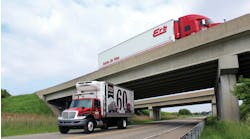If you are reading this column, you already know that the trucking industry is facing a growing epidemic across the country — a driver shortage. Fleets, in terms of driver size, experienced a downsizing because of the recession, choosing to pare down to match decreasing freight levels. Exhibiting Darwinism at its finest, carriers retained their seasoned, most qualified drivers to haul their freight during the recession, making our roadways safer in the process. As freight begins to turn around, however, fleets are searching everywhere for drivers to haul it, so cue the entry-level driver.
As the driver shortage grows larger on a daily basis, entry-level drivers are entering a field in which there is a premium placed on quality. Fresh out of school without a CSA record, these high-quality candidates from schools certified through the Professional Truck Driver Institute (PTDI) come exceptionally trained and are consistently recognized as being the best prepared when entering such a demanding field. In fact, new drivers graduating from PTDI-certified schools can be considered the cream of the crop due to the standards that are placed on the schools in order to achieve and maintain certification.
Everyone in trucking has long recognized the need for drivers. Because of this, CDL mills have populated the industry — not with the goal of properly training entry-level drivers, but with that of making money. I am not saying that every school that is not PTDI-certified is a CDL mill; what I am saying is PTDI schools have taken that extra step to assure their programs offer top-notch training to drivers entering the industry. Simply put, many schools across North America offer poor programs or insufficiently trained instructors that lead to students being ill-prepared for their future careers on the highways.
Insurance providers are also starting to recognize the quality of training that a graduate of a PTDI school brings to the table. Liberty Mutual even encourages carriers to hire from schools that are PTDI certified "due to the rigid certification standards and the schools undergoing periodic audits of their program to ensure that they meet those standards."
While carriers know that FMCSA is working on publishing a rule on entry-level driver training requirements, the question remains, why wait for a rule?
PTDI curriculum and standards have already been developed for entry-level drivers to achieve a high level of training that provides them with the necessities needed to succeed in the industry. With these high standards, carriers find that drivers who have graduated from PTDI-certified schools are better prepared for driving in their fleets. While no one except the people at FMCSA really know what any driver training regulation will say until it finally hits the Federal Register, those in the industry can take note that quality standards already exist through PTDI-certified schools that have adopted curriculum proven to produce high-quality drivers.
In the end, it is the goal of every fleet to find the right drivers to safely haul its freight. When hiring and retaining a driver to complete that task, look no further than a school that has already done its homework — a PTDI-certified school that has trained its drivers in a manner that will reflect in your fleet, safely.
David Heller, CDS, is director of safety and policy for the Truckload Carriers Assn. He is responsible for interpreting and communicating industry-related regulations and legislation to the membership of TCA. Send comments to [email protected].


